———————————————————————————————————-
TS Eliot and Virginia Woolf – what if?, December 2021
 In an essay published in the Los Angeles Review of Books, Megan Quigley, who has had access to Eliot’s letters to Emily Hale, offers “new insight” into the friendship between Eliot and Virginia Woolf. Quigley writes that Eliot had been invited to visit Woolf on the weekend that her death was announced in 1941; because of illness he had turned down the invitation.
In an essay published in the Los Angeles Review of Books, Megan Quigley, who has had access to Eliot’s letters to Emily Hale, offers “new insight” into the friendship between Eliot and Virginia Woolf. Quigley writes that Eliot had been invited to visit Woolf on the weekend that her death was announced in 1941; because of illness he had turned down the invitation.
“What if Eliot’s illness hadn’t kept him home,” wonders Quigley, “what if he’d eagerly accepted the invitation and shown up at the Woolfs’ house in Sussex for the weekend, as he had several times before?”
When Woolf’s body was discovered, Eliot wrote to Hale: “She was to me like a member of my own family.”
Quigley examines the photographs of Woolf with the Eliots on a previous visit, and Woolf’s comments in letters which have coloured our view of Vivienne, in the light of the relationship we now know to have existed at the time between Eliot and Hale. When Eliot went off to Harvard for seven months, Woolf wrote in a letter to Ottoline Morrell that “I hope the separation is complete and final, as it promised to be”.
“What Woolf didn’t seem to know,” writes Quigley, “(and which could impact her portrayal of Vivien), is that Tom was, in part, moving there to be with or near Emily Hale.”
———————————————————————————————————-
TS Eliot International Summer School 2022, December 2021
 The Programme has been announced for the 2022 TS Eliot International Summer School.
The Programme has been announced for the 2022 TS Eliot International Summer School.
The Summer School will run from 9th to 17th July 2022. There will be lectures by many of the UK’s leading Eliot scholars, including Mark Ford, Seamus Perry and Sarah Kennedy, and by visiting academics including Megan Quigley, Leonard Diepeveen, Patrick Query, and the Summer School’s Director, Anthony Cuda. There are also a series of small-group seminars, and a poetry workshop with the poet and academic Hannah Sullivan.
The Summer School is held primarily at the University of London, in Bloomsbury. On the 10th July the School will travel to the Annual TS Eliot Festival at Little Gidding, and on 16th July visit Burnt Norton.
The 2022 Programme is here and full details of the Summer School, for which registration will open in January, are here.
———————————————————————————————————-
Journey of the Magi analysed in BBC’s Poetry Extra, December 2021
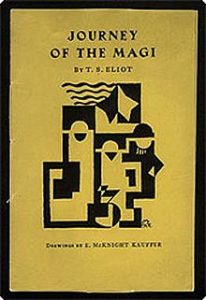 For Poetry Extra, the poet Daljit Nagra has retrieved from the BBC Radio 4 archive an episode of Adventures in Poetry, first broadcast in 2011, on TS Eliot’s Journey of the Magi.
For Poetry Extra, the poet Daljit Nagra has retrieved from the BBC Radio 4 archive an episode of Adventures in Poetry, first broadcast in 2011, on TS Eliot’s Journey of the Magi.
In this 30-minute programme, which features the reading of the poem by Alec Guinness, contributors including Rowan Williams and Christopher Ricks analyse the work, with an excerpt from a broadcast in which Eliot himself talks about his Ariel poems. The poem is placed in the contexts of Eliot’s contemporaneous conversion and nationalisation, and linked to the Christmas sermon by Lancelot Andrewes which inspired its opening.
The programme is now available here but only until the New Year.
———————————————————————————————————-
Facsimile of TS Eliot’s Inventions of the March Hare notebook, December 2021

 A beautiful facsimile has been published of the young TS Eliot’s handwritten notebook. Commonly known by Eliot’s handwritten title, Inventions of the March Hare, the notebook in which he wrote out poems from the age of 21, including Portrait of A Lady and The Love Song of J Alfred Prufrock, has been reproduced as The Gloucester Notebook (Galileo Publishers) – although it is not currently available to UK customers.
A beautiful facsimile has been published of the young TS Eliot’s handwritten notebook. Commonly known by Eliot’s handwritten title, Inventions of the March Hare, the notebook in which he wrote out poems from the age of 21, including Portrait of A Lady and The Love Song of J Alfred Prufrock, has been reproduced as The Gloucester Notebook (Galileo Publishers) – although it is not currently available to UK customers.
Its publisher and editor Robert Hyde had lived in Massachusetts, where he first became aware of Eliot’s connection with Gloucester. He then viewed the original notebook in the Berg Collection at the New York Public Library, and had the idea of reproducing it.
The texts of the poems within the notebook were published by Faber in 1996, in the academic volume Inventions of the March Hare, edited and thoroughly annotated by Christopher Ricks. However, Hyde felt that the poetry itself was somewhat “buried” within the study, and that “a facsimile would be more widely interesting than Ricks’s deep exploration…I wanted to publish something for people who love the verse, rather than for those who want to trace the origin of a particular phrase.”

Within boards echoing the original cover, the handwritten pages of Eliot’s notebook have been beautifully reproduced, with facing transcriptions. These were often fair copies rather than working drafts, with relatively few amendments, and so on the whole are perfectly legible, with the handwriting itself developing over the years. “The soft, round schoolboy hand in pale blue ink becomes adult, black, spiky and neurasthenic,” writes Robert McCrum, the writer, editor and former Faber executive, in an informative Foreword tracing the notebook’s history and significance.
The title, The Gloucester Notebook, was Hyde’s personal choice, partly to avoid confusion with the 1996 volume, but primarily because he “wanted Americans to realise just how significant and formative Gloucester was for Eliot.”
At present, however, the book is published only in the US and Canada; Hyde believes that it will be published in the UK at some later date.
———————————————————————————————————-
Designer Es Devlin to give Abbey Theatre’s 2021 TS Eliot Lecture, December 2021
 The Annual TS Eliot Lecture at the Abbey Theatre, Dublin will once again be streamed online from London. This will be the sixth in their series of lectures inspired by Eliot’s impact on contemporary culture and society
The Annual TS Eliot Lecture at the Abbey Theatre, Dublin will once again be streamed online from London. This will be the sixth in their series of lectures inspired by Eliot’s impact on contemporary culture and society
This year’s lecture will be given by Es Devlin, the stage designer who creates large-scale installations and stage sculptures that combine light, music, and language. She has worked in theatre, opera, Olympic ceremonies, and for performances by musicians such as U2 and Beyonce.
Details of the lecture, which will be streamed on the Abbey Theatre’s YouTube channel on December 19th and then available for a month, are here
———————————————————————————————————-
Autumn issue of Exchanges, our Society quarterly, November 2021
 The Autumn issue of our Society quarterly is now available. Its contributions from members include a response by Christopher Ricks and Jim McCue to a remark in our Spring issue; a reflective piece on re-encountering Eliot’s poetry after a lapse of twenty years; an initial response to Seamus Perry’s T S Eliot Lecture; and a quick look at Eliot’s letters of November 1921, as the great poem of 1922 began to take shape
The Autumn issue of our Society quarterly is now available. Its contributions from members include a response by Christopher Ricks and Jim McCue to a remark in our Spring issue; a reflective piece on re-encountering Eliot’s poetry after a lapse of twenty years; an initial response to Seamus Perry’s T S Eliot Lecture; and a quick look at Eliot’s letters of November 1921, as the great poem of 1922 began to take shape
You can download this new issue here.
———————————————————————————————————-
International Conference on TS Eliot in translation, November 2021
 An international conference is to be held in October 2022 by LARCA, the Laboratoire de Recherche sur les Cultures Anglophones, at the University of Paris, on TS Eliot in translation. A call for papers has been posted.
An international conference is to be held in October 2022 by LARCA, the Laboratoire de Recherche sur les Cultures Anglophones, at the University of Paris, on TS Eliot in translation. A call for papers has been posted.
The LARCA “invites TS Eliot scholars, and specialists of Modernism more generally, to share and discuss their (re)assessment of the reception of TS Eliot’s works and ideas in the various languages of Europe. We are especially, but not exclusively, interested in probing the role of translation in reception and canonization processes, that is, in the formation and reshaping of literary canons and their effect on the circulation of literary theory. Conversely, examining translation processes and their effects on literary reception may shed new light on reading, criticizing and teaching Eliot.”
Full details of the Conference have been published; proposals are to be submitted before March 22nd, 2022.
———————————————————————————————————-
Draft broadcast typescript with TS Eliot’s autograph corrections, November 2021
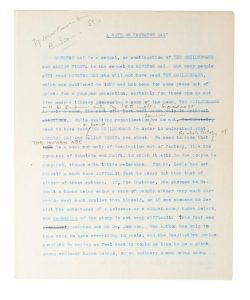 As part of the Library of DG Bridson, the draft typescript for Eliot’s BBC broadcast of 25 May 1955, in which he discussed Monstre Gai and Malign Fiesta by Wyndham Lewis, has come up for sale.
As part of the Library of DG Bridson, the draft typescript for Eliot’s BBC broadcast of 25 May 1955, in which he discussed Monstre Gai and Malign Fiesta by Wyndham Lewis, has come up for sale.
The poet, journalist and radio producer Douglas Geoffrey Bridson was responsible for over 800 broadcasts in his career at the BBC from 1933 to 1969. He developed friendships with nearly all the major literary figures of his day, but most notably with Ezra Pound, Wyndham Lewis and TS Eliot. The sale of his library, catalogued here by the booksellers Bernard Quaritch, includes over a hundred items by Pound and Lewis, several with connections to, or introductions by, TS Eliot.
The seven-page typescript of TS Eliot’s broadcast (item 38) has numerous autograph pencil corrections and additions by Eliot throughout. “Eliot evidently struggled in particular with how to express his views on Lewis’s theology (which had long been a point of contention between them),” says the catalogue. “Several efforts result in the final formulation, ‘For instance I do not share his low opinion of the intelligence of Angels’.”
The typescript is for sale at £4500 – plus, to a UK purchaser, VAT.
———————————————————————————————————-
Ralph Fiennes on Four Quartets, November 2021
 In an interview on BBC Television’s The Andrew Marr Show, Ralph Fiennes talked about Eliot’s Four Quartets, and their themes of time, love, patriotism and death.
In an interview on BBC Television’s The Andrew Marr Show, Ralph Fiennes talked about Eliot’s Four Quartets, and their themes of time, love, patriotism and death.
Broadcast on Remembrance Sunday, the item includes some brief rehearsal footage from Fiennes’ stage production of Four Quartets, which is now showing at the Harold Pinter Theatre in London for a limited run.
The interview, available on BBC Sounds (the item begins at 1:06:30) ends with a reading by Fiennes from Little Gidding.
Then on the BBC Radio 4 arts programme Front Row, Fiennes was interviewed at greater length about the production, its audiences, and his own developing relationship with the work, which he views as “A spiritual enquiry into what it is to be human…It’s really a meditation on life, this journey of ours and our relationship with the divine.” The 13 minute segment, which can be heard on BBC Sounds (begins at 28.00), contains several longer readings from Little Gidding.
And in The Times (£), Fiennes describes revisiting the poems and learning them during lockdown; his self-direction of his performance; and his visits to the three UK Quartet locations. This online version of the article includes a b/w photograph taken by Fiennes himself of “The deep lane shuttered with branches”, just outside East Coker.
(Ralph Fiennes’ production of Four Quartets previously toured provincial theatres, and extensive details and reviews are on our Events page, June 2021.)
———————————————————————————————————-
How TS Eliot went from apprenticeship to accomplishment, November 2021
 A new book asks the question, “How does a young man who writes uninspired doggerel about wilting flowers transform himself – in twenty months, without coaching or mentors – into the author of The Love Song of J Alfred Prufrock?”
A new book asks the question, “How does a young man who writes uninspired doggerel about wilting flowers transform himself – in twenty months, without coaching or mentors – into the author of The Love Song of J Alfred Prufrock?”
In Becoming T. S. Eliot: The Rhetoric of Voice and Audience in Inventions of the March Hare, Jayme Stayer aims to “explain this staggering accomplishment, following Eliot’s artistic development and tracking parallel transitions in his personal maturation.”
Stayer rearranges the juvenilia in Inventions – which also appear in The Poems – into “the chronological order of their composition, teasing out the narratives of their making”. His objective is to show how “the awkward apprentice becomes the accomplished craftsman”.
Jayme Stayer is an associate professor of literature at Loyola University Chicago. He is the president of the US-based International TS Eliot Society, and was one of the co-editors of The Complete Prose.
The book is published in the US by Johns Hopkins University Press, but is now available in the UK – 360 pages, Paperback, ISBN: 9781421441047 £26.00
Members of the TS Eliot Society (UK) can enjoy a 30% discount off the paperback RRP – see the Members Area for details
———————————————————————————————————-
Elizabeth Bowen and TS Eliot, November 2021
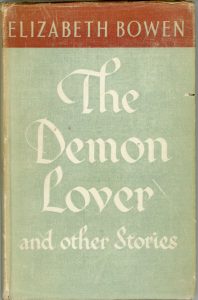 The latest issue of the Elizabeth Bowen Review, the academic journal of the Elizabeth Bowen Society, carries an essay entitled The Familiar Compound Ghost of The Demon Lover: A Correspondent Reading of Elizabeth Bowen and T. S. Eliot.
The latest issue of the Elizabeth Bowen Review, the academic journal of the Elizabeth Bowen Society, carries an essay entitled The Familiar Compound Ghost of The Demon Lover: A Correspondent Reading of Elizabeth Bowen and T. S. Eliot.
The author, Dr K. Narayana Chandran, of the University of Hyderabad, draws upon Four Quartets to explore the ways in which a reader can make connections between two literary works. “Allusion sometimes creates an illusion of co-presence,” he writes. “I find this ghost of an allusion interesting in what I would call a correspondent reading.”
“Elizabeth Bowen’s The Demon Lover and a few passages from T. S. Eliot’s Four Quartets, especially Little Gidding II, offer very persuasive samples of such echoes. In this ghostly correspondence, the traversal of ghosts is both literal and symbolic, given its common spatio-temporal setting in Bowen and Eliot.”
———————————————————————————————————-
Annual TS Eliot Lecture live once again, November 2021
 The 2021 Annual TS Eliot Lecture is to be given live, by Professor Seamus Perry in Oxford on Monday November 15th. His title is TS Eliot’s Liberalism.
The 2021 Annual TS Eliot Lecture is to be given live, by Professor Seamus Perry in Oxford on Monday November 15th. His title is TS Eliot’s Liberalism.
Eliot, a self-declared Anglo-Catholic, classicist and Royalist, had many critical things to say about Liberalism; yet looking at both his poetry and his politics, Professor Perry will consider whether Eliot may have shared more with the liberalism he deplored than might at first appear.
THIS EVENT IS NOW SOLD OUT
———————————————————————————————————-
TS Eliot, The Little Review and Transnational Print Culture, November 2021
 In a short essay in The Modernist Review, Zoe Rucker examines Eliot’s contributions to the US periodical The Little Review, in particular “tracing his self-fashioning of a transnational identity”.
In a short essay in The Modernist Review, Zoe Rucker examines Eliot’s contributions to the US periodical The Little Review, in particular “tracing his self-fashioning of a transnational identity”.
Eliot once said of The Little Review that during the earlier part of his career, ‘The Little Review was the only periodical in America which would accept my work, and indeed the only periodical there in which I cared to appear’.
Contributing as an expatriate, Rucker argues that “the space provided by the magazine allowed Eliot himself to negotiate his own transnationalism while also craftily promoting the writing he and other expatriate writers associated with the Little Review were producing.”
———————————————————————————————————-
The Waste Land as a post-pandemic poem, November 2021
 In an article posted by READ: Research in English at Durham, Gwenda Koo explores How the many voices of TS Eliot’s The Waste Land speak to us after the pandemic.
In an article posted by READ: Research in English at Durham, Gwenda Koo explores How the many voices of TS Eliot’s The Waste Land speak to us after the pandemic.
She argues that “The pandemic has left us with a ‘new normal’, in which our sense of personal connection has changed while a feeling of crisis remains.”
Now, she believes, “as we are easing our way back to the ‘new normal’, a reread of the poem sheds light upon the meaning of human connection – both with the world and with ourselves.”
———————————————————————————————————-
Inscribed copy of Little Gidding reflects Eliot’s wartime, October 2021
 A First Edition of Little Gidding has come on to the market, affectionately inscribed by TS Eliot to “Mappie”, the mother of the poet Hope Mirrlees.
A First Edition of Little Gidding has come on to the market, affectionately inscribed by TS Eliot to “Mappie”, the mother of the poet Hope Mirrlees.
During World War 2, Eliot would often spend long weekends at Shamley Wood, the Mirrlees’ home near Guildford, Surrey, and wrote parts of Four Quartets while staying there. He became particularly fond of Emily Mirrlees, the poet’s mother, affectionately known as Mappie, and wrote to Emily Hale that “I am very fond of the old lady (to tell the truth, I like her better than Hope).”
(A full account of their relationship is contained in The Letters of TS Eliot Vol 9, 1939-1941, p170)
Inscribed “For Mappie from T.S.E.”, the book is for sale from dealer Peter Grogan for £6,750.
———————————————————————————————————-
TS Eliot on cricket, October 2021
 An unusual letter written by TS Eliot is coming up for auction in the US.
An unusual letter written by TS Eliot is coming up for auction in the US.
Written to the Headmaster of Canford School in Wimborne, Dorset in 1953, the letter begins with Eliot admitting that he enjoys watching good cricket, but he goes on to deny that he ever coached the cricket during his period of teaching at Highgate School.
“Having spent my boyhood in America,” he explains, “my early experience was of a very different game, and far from being qualified to coach, I am not even a good critic of such matches as I watch.
“I do not think that one can ever be a really qualified critic of any game one has never practised oneself in one’s own youth.”
The letter (click image to enlarge) is estimated here to sell for $600-$800 on October 23rd
UPDATE: The letter was “passed” at auction, and has subsequently been put up for direct sale online from the US at a price which, including shipping, will convert to approx £490.
———————————————————————————————————-
Faber confirm publications for centenary of The Waste Land, September 2021
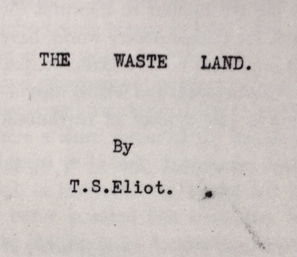 Faber have released details of the two books they will publish to celebrate the centenary of The Waste Land in 2022.
Faber have released details of the two books they will publish to celebrate the centenary of The Waste Land in 2022.
On 3rd February, marking 50 years since the manuscripts were published in facsimile, Faber will publish a new edition of The Waste Land: A Facsimile and Transcript of the Original Drafts, in which Eliot’s own pages of typescript and manuscript will be published in “startling” full colour for the first time.
The original edition, edited by the poet’s widow, Valerie Eliot, featured black and white reproductions of the original manuscript pages. This new edition is a reissue in colour, with corrections, of the text of the 1980 reprint, and also includes an appendix of original materials not previously made available.
Then in September 2022, Faber will publish The Waste Land: T S Eliot, Ezra Pound and the Making of a Masterpiece by Matthew Hollis, which will “reconstruct the genesis” of the poem.
Faber say that Hollis “tells the story of the cultural and personal trauma that forged the poem through the interleaved lives of its protagonists – of Ezra Pound, who edited it, of Vivien Eliot, who endured it, and of TS Eliot himself, whose private torment is woven into the fabric of the work. The result is an engrossing story of lives passing in opposing directions: Eliot’s into redemptive stardom, Vivien’s into isolated despair, Pound’s into unforgiving darkness.”
Alex Bowler, Faber publisher, said: “2022 will be a year of celebration, led by Matthew Hollis’ surpassing ‘biography’ of the poem. The perfect match of author and subject, it will reilluminate the poem, shedding new light on what we think we know of The Waste Land and its making. Likewise, the revised colour facsimile edition will provide a depth of new information and understanding for those readers most familiar with the work.”
———————————————————————————————————-
TS Eliot and Samuel Beckett paired in new book, September 2021
 A new book, Eliot and Beckett’s Low Modernism explores the relation between humility and humiliation in the works of TS Eliot and Samuel Beckett.
A new book, Eliot and Beckett’s Low Modernism explores the relation between humility and humiliation in the works of TS Eliot and Samuel Beckett.
“Tracing the relation between negative affect, ethics, and aesthetics,” say the publishers, “Eliot and Beckett’s Low Modernism demonstrates how these two major modernists recuperate the affinity between humility and humiliation – concepts whose definitions have largely been determined by philosophy and theology.”
The author, Rick de Villiers, is a Lecturer in English at the University of the Free State, Bloemfontein, South Africa. He has published articles in Literature and Theology, Journal of Modern Literature, Journal of Literary Studies, English Academy Review and English Studies in Africa.
“Rick de Villers presents a fascinating study of an ‘unlikely pair’ of authors,” says Scott Freer, Editor of our academic Journal of the TS Eliot Society, “united by the perennial theme of humility.”
The book is published by Edinburgh University Press, and full details, formats and ordering are here.
Members of the TS Eliot Society (UK) can enjoy a generous 30% discount on the purchase price of this book – use the members’ password to visit the Members Area for details.
———————————————————————————————————-
Edward Fox OBE reads TS Eliot’s Four Quartets, September 2021
 A new audio recording of Four Quartets by the distinguished actor Edward Fox has been made available by the Trustees of the Eliot Estate. The recording was performed from memory, and the Trustees of the Eliot estate have made it available to mark TS Eliot’s birthday on 26th September.
A new audio recording of Four Quartets by the distinguished actor Edward Fox has been made available by the Trustees of the Eliot Estate. The recording was performed from memory, and the Trustees of the Eliot estate have made it available to mark TS Eliot’s birthday on 26th September.
Now 84, Edward Fox OBE first encountered Four Quartets almost fifty years ago. “At the time, I didn’t understand a word of it,” he recalls.
Over subsequent years Fox read and studied the work – “It’s one of those pieces that demand you know it by heart to really understand it. You don’t really know it until you’ve learned it backwards” – and performed it in the West End in 1980 in a production of Eliot’s poetry titled Let Us Go Then, You and I, with Michael Gough and Eileen Atkins. Having committed the whole poem permanently to memory, he toured his reading of it throughout the UK in the mid-2000s, last performing it in 2011.
The new recording, performed from memory and separated into each of the four poems, can be heard via the website of the TS Eliot Foundation here.
———————————————————————————————————-
Broadcast of a musical portrait of TS Eliot, September 2021
 A rarely heard “sound painting” of TS Eliot has been broadcast by BBC Radio 3.
A rarely heard “sound painting” of TS Eliot has been broadcast by BBC Radio 3.
As Others See Us (1990) is a set of mixed ensemble compositions by James MacMillan, which were based on portraits in the National Portrait Gallery, London, including Eliot.
“I attempt to capture the split personality of TS Eliot seen in a Cubist portrait by Patrick Heron,” explained the composer. “I took the two profiles to refer to his dual national characteristics – the American who was fascinated by England and especially by High Anglican ritual, therefore his Englishness is captured by quasi-liturgical music; and his American-ness is presented in a 1920s jazz style, for which he was reputed to have had a keen interest.”
For a limited time you can hear a performance of the short (5mins) piece at 55 minutes here.
———————————————————————————————————-
Archive of Professor Peter Mayer reveals letters from TS Eliot, September 2021
 An archive including twenty letters from TS Eliot has briefly revealed some of Eliot’s views on European writers. The letters were written by Eliot to Professor Peter Mayer, who published five books through Faber & Faber between 1944 and 1959.
An archive including twenty letters from TS Eliot has briefly revealed some of Eliot’s views on European writers. The letters were written by Eliot to Professor Peter Mayer, who published five books through Faber & Faber between 1944 and 1959.
Interesting views were expressed by Eliot in thank-you letters to Mayer for gifts of books, by Goethe (his West-Östlicher Divan, which Eliot says “ought to be in the library of every man of letters and I shall both treasure it and use it”) and Paul Valéry (“The conversations with Valéry are a very strange reminder of a highly civilised but rather decadent world which had disappeared!”).
Other subjects touched upon include André Gide and Eliot’s The Cocktail Party; Eliot writes: “I have never read Gide’s Thésé, but curiously enough a phrase from a very early work of his, which I expect you know, called Prométhée mal Enchaîné, stuck in my head in connection with The Cocktail Party. It is simply the text of the Prometheus lecture: Il faut avoir un aigle.”)
A US dealer, Charles Agvent, was asking $25,000 for the archive, which also included many other letters by principals of Faber including Geoffrey Faber, Richard de la Mare, Morley Kennerley, and P. F. du Sautoy, as well as letters by secretaries and others. Although no longer available, some further details of the archive can be seen here .
———————————————————————————————————-
Sebastian Faulks opts for TS Eliot, September 2021
 The author Sebastian Faulks would choose the poetry of TS Eliot as his desert island companion.
The author Sebastian Faulks would choose the poetry of TS Eliot as his desert island companion.
Asked by the Daily Mail which book he would take to a desert island, the novelist initially chooses Proust, “because it’s so long and would keep me going.”
“It might be better, though, to take some poetry,” he reconsiders.
“And if I had to choose, I would probably go for The Complete T.S. Eliot.”
———————————————————————————————————-
Rare print of TS Eliot portrait photograph, August 2021
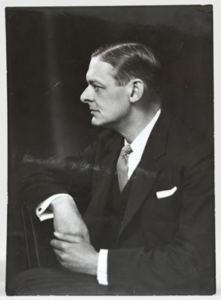 A rare print of a photographic portrait of TS Eliot has come on the market.
A rare print of a photographic portrait of TS Eliot has come on the market.
The portrait was taken by Elliott & Fry, a firm established in Baker Street, London in 1863. In the early 1940s the studio was bombed and most of the early negatives were destroyed; the National Portrait Gallery owns all the surviving Elliott & Fry negatives, including the half-plate negative of this image.
Taken around 1930, this image will be recognised by many from the dustjacket cover of The Letters of TS Eliot Volume 5, 1930-1931
This 152 x 108mm print is described as “a fine copy”, with Elliott & Fry’s copyright stamp on the reverse, and is priced at £375 by the dealers Peter Harrington.
———————————————————————————————————-
Faber country house frequented by TS Eliot up for sale, August 2021
 TyGlyn Aeron, once the country house of Geoffrey Faber and frequently visited by TS Eliot, is up for sale.
TyGlyn Aeron, once the country house of Geoffrey Faber and frequently visited by TS Eliot, is up for sale.
Geoffrey Faber bought TyGlyn Aeron in the summer of 1930. The house, in Ciliau Aeron, near Lampeter, was a retreat from London for his family, where they went as often and for as long as they could. Faber once wrote that the estate was able to induce in him a ‘god-like mood’.
Eliot became a regular visitor to the house. “I have had the most pleasant week’s visit within memory,” he wrote to Enid Faber in 1935. “Several days of it are individually unforgettable, but what is more important is the recollection of (for me) stupendous physical activity in tranquillity – I mean tranquillity then as in recollection…I will repeat, that I have never had a week’s visit of more unadulterated pleasure.”
For Thomas Faber’s fourth birthday, Eliot invited “All Pollicle Dogs and Jellicle Cats…To come with your Whiskers & Tails & Hair on/To Ty Glyn Aeron/Ciliau Aeron” (Poems II, 162). And a return journey from TyGlyn, “through that delightful and rather magical landscape”, inspired his Landscape III – Usk.
The new Letters of TS Eliot Volume 9, 1939-41, along with several letters planning visits or written during them, also contains a photo of the house, and a delightful photo of Eliot himself dozing within it. And an article on the house by Mary Morgan was published in the Summer 2019 issue of our Society quarterly, Exchanges.
In recent years the house became a restaurant with rooms and wedding venue, and is now being offered for sale as a “diversely appealing” commercial property for £850,000.
———————————————————————————————————-
Summer issue of Exchanges…, our Society quarterly, August 2021
 The Summer issue of our Society quarterly is now available. Its contents include several perspectives on Ralph Fiennes’ performance of Four Quartets; an article on the flyleaf ‘blurbs’ describing Eliot’s poetry; and a published reminiscence of Eliot by his friend Conrad Aiken.
The Summer issue of our Society quarterly is now available. Its contents include several perspectives on Ralph Fiennes’ performance of Four Quartets; an article on the flyleaf ‘blurbs’ describing Eliot’s poetry; and a published reminiscence of Eliot by his friend Conrad Aiken.
You can download this new issue here.
———————————————————————————————————-
TS Eliot’s 1910 Harvard Yearbook, August 2021
 A copy of Harvard’s 1910 Class Album, containing an entry for TS Eliot, has been put up for sale.
A copy of Harvard’s 1910 Class Album, containing an entry for TS Eliot, has been put up for sale.
The Harvard Class Album of 1910, the year of Eliot’s graduation, lists his date of birth, previous education and home town, along with his Harvard participations: “Stylus, Signet, Southern Club, Digamma Club, Advocate”. Eliot published ten undergraduate poems in the Harvard Advocate between 1907 and 1910.
 Listed by a seller along with other yearbooks, containing US celebrities from Madonna to Buzz Aldrin, Eliot’s yearbook is for sale at approx £650.
Listed by a seller along with other yearbooks, containing US celebrities from Madonna to Buzz Aldrin, Eliot’s yearbook is for sale at approx £650.
———————————————————————————————————-
TS Eliot Studies Annual Volume 3 now available, August 2021
The third volume of the academic TS Eliot Studies Annual  is now available. The Annual, edited by Frances Dickey and Julia E Daniel, incorporates both original and previously published material.
is now available. The Annual, edited by Frances Dickey and Julia E Daniel, incorporates both original and previously published material.
The 2021 volume includes six essays under the umbrella of First Readings of the Eliot–Hale Archive. These are “the initial responses of six readers fortunate enough to have spent time with the archive before it was temporarily closed” (first published in the Spring 2020 issue of Time Present, the newsletter of the US-based International TS Eliot Society).
There are three essays in a Special Forum on Eliot and Green Modernism; and seven further essays on aspects of Eliot’s life and works, together with Bibliographies of Eliot-related publications in 2017 and 2018. Contributors to the volume include Lyndall Gordon, Jeremy Diaper, Sara Fitzgerald and Karen Christensen.
The Annual is available in the UK from Liverpool University Press and full details of its contents are here.
———————————————————————————————————-
Postponed Volume 9 of TS Eliot’s Letters to be published, August 2021
 The long-awaited Letters of TS Eliot, Volume 9, is now being published on 2nd September.
The long-awaited Letters of TS Eliot, Volume 9, is now being published on 2nd September.
This latest volume covers the years 1939 to 1941. “After exhausting himself through nights of fire-watching in the London wartime blackout, [Eliot] travels the country,” say the publishers, Faber, “delivers talks and advises a fresh generation of writers.” Correspondents include Auden, Barker, Pound, Mirrlees, Spender, Tippett and Woolf.
The volume covers the production of The Family Reunion; the publication of The Idea of a Christian Society; Old Possum’s Book of Practical Cats; and, according to Faber, “Four Quartets, Eliot’s culminating masterpiece, is discussed in detail.”
Letters of TS Eliot, Volume 9: 1939-1941 (Faber), 1008pp, ISBN 9780571362813, cover price £60.00. pre-order from £41.55 (Amazon)
———————————————————————————————————-
Stephen King on Prufrock: “It’s a great poem, a great existential poem”, August 2021
The prolific horror and crime writer Stephen King has spoken in an interview about the significance of The Love Song of J Alfred Prufrock in his books. And he admits that “Sometimes, for me, in the course of writing some narration, or writing a character’s feelings, that will pop up into my mind.”
in an interview about the significance of The Love Song of J Alfred Prufrock in his books. And he admits that “Sometimes, for me, in the course of writing some narration, or writing a character’s feelings, that will pop up into my mind.”
An article by Brenna Ehrlich on CrimeReads had previously pointed out the many appearances of Eliot’s poem within King’s books. She first noticed a character in his Pet Semetary quoting “Oh, do not ask what is it; let us go and make our visit”, as they take their cat to be buried. The same line is also spotted in two more of King’s books, Finders Keepers and The End Of The Watch.
Prufrock also appears in The Shining; “In the room the women come and go…” the alcoholic writer Jack Torrance thinks about the Overlook Hotel, “and the Red Death held sway over all.”
Jack’s son Danny Torrance, reappearing in a later book, Doctor Sleep, “could see the Cowboy Boot patrons come and go, probably not talking about Michelangelo”. Whereas in The Institute, lead character Luke mutters, “Talking of Michelangelo…”
King is presumably a fan of Eliot, since The Hollow Men appears in two books, Pet Semetary (again) and Under the Dome; while The Waste Land plays prominently into his The Dark Tower series, most notably in The Dark Tower III: The Waste Lands. But Prufrock is clearly the most widely quoted; and to end an interview in Rolling Stone magazine Ehrlich finally asks King about the poem.
“You have to keep in mind that when I’m working, I’m not sitting down with all these words in my head,” says King. “I’m just sort of going with it, going with the flow. And sometimes that has a particular resonance to me, and then I use it. ‘Let us go then, you and I… ‘
“God! Yeah, it’s a great poem, a great existential poem. Yeah. And I think that it appeals to a certain cast of mind, too.
“Somebody who has a view of a world that’s a little bit despairing, but not immobilized by despair.”
———————————————————————————————————-
Ralph Fiennes talks about Four Quartets, July 2021
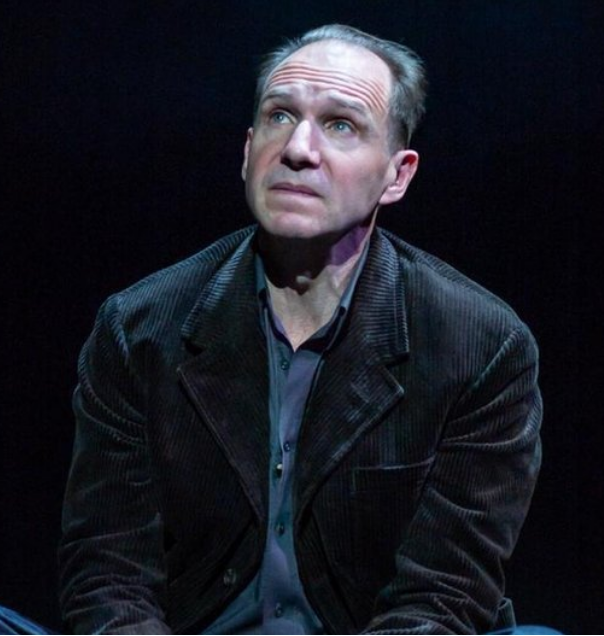 In an interview for the Yorkshire Post, Ralph Fiennes has spoken about his relationship with Four Quartets, and how and why he has brought it to the stage.
In an interview for the Yorkshire Post, Ralph Fiennes has spoken about his relationship with Four Quartets, and how and why he has brought it to the stage.
“I’ve known it since I was quite young – we had the TS Eliot recording – so it’s been floating in and out of my awareness over the years,” he says. “In the first lockdown last year I gave myself little things to engage my mind and memory, and I thought I’d learn Four Quartets. And then various things I thought I’d do in the early part of this year went away – films and so on – and it sort of transitioned. Could it not be put in a context where it was given a kind of gently, appropriately judged theatrical context?”
Fiennes is keen to bring the work to a younger audience, an ambition in which he felt that Eliot’s own voice was “not helpful…It’s an old-school delivery with a certain kind of refined English intellectual speaking: it has its own kind of beauty and it’s wonderful to hear his voice but the dynamic of its communicative ability more for younger people today I think is questionable, because it feels from another time.”
Whereas Fiennes wants people to appreciate the relevance which the poems have today. “I have a belief that the poem can work and I think it does chime with the big questions or the existential questions that I think we are asking about who we are – and I think that’s thrown into focus by the Covid crisis.”
The full interview is here.
———————————————————————————————————-
Unique TS Eliot books come to light, July 2021
A fascinating copy of Eliot’s 1955 address Goethe as the Sage  has surfaced, bearing not only an inscription to another Faber poet, but also an editorial correction in Eliot’s hand which is not reflected in the Critical Edition of The Complete Prose of TS Eliot.
has surfaced, bearing not only an inscription to another Faber poet, but also an editorial correction in Eliot’s hand which is not reflected in the Critical Edition of The Complete Prose of TS Eliot.
The book (right) contains the address, in both English and a German translation, which Eliot wrote upon receiving the Hanseatic Goethe Prize for 1954. This copy is inscribed from Eliot to the poet Vernon Watkins, whom Eliot edited at Faber.
But in addition, a transposition is made in Eliot’s hand, changing the meaning of a sentence within the address. A sentence beginning “It is…”, positing a choice between “Goethe or the scientists”, becomes a question beginning “Is it…”, asking whether that choice is valid. This correction is not reflected in the edited text contained within The Complete Prose.
 The book has just come up for sale by Neil Pearson Rare Books, and details are here.
The book has just come up for sale by Neil Pearson Rare Books, and details are here.
 In addition, Pearson has for sale a copy of Meutre Dans La Cathédrale, a French translation of 1944, inscribed to Edmond Limbourg by TS Eliot. Limbourg was the organiser of a Grandes Conferences Catholiques session of tributes to Eliot, introduced by Robert Speaight, who came to prominence playing Becket in the first production of Murder In The Cathedral. A ticket for this event is laid-in to the book; details are here.
In addition, Pearson has for sale a copy of Meutre Dans La Cathédrale, a French translation of 1944, inscribed to Edmond Limbourg by TS Eliot. Limbourg was the organiser of a Grandes Conferences Catholiques session of tributes to Eliot, introduced by Robert Speaight, who came to prominence playing Becket in the first production of Murder In The Cathedral. A ticket for this event is laid-in to the book; details are here.
And among other inscribed titles, Pearson has a copy of The Moonstone by Wilkie Collins, the book much admired by Eliot, and a copy clearly given by him as a Christmas present, as it is inscribed “to W.P. Watt Esq. from T.S. Eliot Christmas 1941”.
———————————————————————————————————-
Scofield Thayer’s First Edition copy of The Waste Land up for auction, July 2021
 A pristine copy of the first edition of The Waste Land is being sold by the descendants of TS Eliot’s friend and publisher Scofield Thayer.
A pristine copy of the first edition of The Waste Land is being sold by the descendants of TS Eliot’s friend and publisher Scofield Thayer.
Eliot met Scofield Thayer at Milton Academy, before they both went to Harvard and later to Oxford. Thayer went on to fund and edit the American literary journal The Dial, to which Eliot contributed, and which first published The Waste Land in its pages.
The copy, with the provenance “Property from the Descendants of Scofield Thayer”, is described as “Uncut, unrubbed, unfaded and as near to pristine as one could hope for, an exceptionally well-preserved copy.” As well as the original salmon printed dustjacket it also has its original glassine inner jacket.
Numbered 192 out of 1000 copies, it is being auctioned by Sotheby’s New York on July 16, with a starting bid of US$26,000 (£18,000) and an estimate of US$30,000 to US$50,000 (£21,700 to £36,000). Details and images are here.
UPDATE: The book was sold for a remarkable US$163,800 – approximately £117,500
———————————————————————————————————-
London dates for Ralph Fiennes’s performance of Four Quartets, July 2021
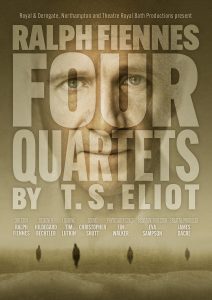 The adaptation of TS Eliot’s Four Quartets by Ralph Fiennes, currently touring regional theatres, will transfer to London’s West End for a series of performances in November and December.
The adaptation of TS Eliot’s Four Quartets by Ralph Fiennes, currently touring regional theatres, will transfer to London’s West End for a series of performances in November and December.
Full details, reviews and box-office links are on our Events page.
———————————————————————————————————-
Faber & Faber history published in paperback, July 2021
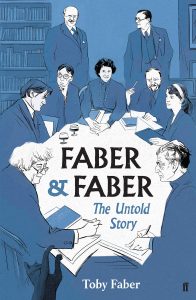 Faber & Faber: The Untold Story, by Toby Faber, has been published in paperback.
Faber & Faber: The Untold Story, by Toby Faber, has been published in paperback.
This history of the publishers, by the grandson of its founder Geoffrey Faber, brings together previously unseen letters and documents, and provides some fascinating insights into TS Eliot’s career at Faber & Faber.
“Inside this literary Vatican, until his death in 1965, TS Eliot was the supreme pontiff” wrote Robert McCrum in The Observer when the book was first published in hardback in 2019. His article also contains a link to an excerpt from the book.
———————————————————————————————————-
A reminiscence of Valerie Eliot, June 2021
 A fascinating and affectionate view of Valerie Eliot has resurfaced in an essay written by Professor Ron Schuchard in 2013 not long after her death.
A fascinating and affectionate view of Valerie Eliot has resurfaced in an essay written by Professor Ron Schuchard in 2013 not long after her death.
The essay, Goodnight Mrs Tom, was published by the Royal Society of Literature in their RSL Review. It has resurfaced from the RSL Library thanks to Helen Meller of the Arvon Foundation, who has chosen the essay as part of the RSL’s Only Connect programme.
The essay contains many personal reminiscences of Valerie, and her “friendship and generosity” to Ron. He recalls the conversations between the two about the constraints which Eliot had imposed upon editions of his work, conversations which resulted in Professor Schuchard editing many significant posthumous Eliot publications, culminating in the Complete Prose.
He concludes that “Thanks to her steadfast loyalty to her husband’s wishes and to her commitment to the totality of his papers, we will soon have all his work on the shelf and online for new generations of students and scholars of modern literature and culture. Vows discharged. Requiescat in pace.”
———————————————————————————————————-
The TS Eliot Studies Annual 2021, June 2021
 The third TS Eliot Studies Annual is to be published later this summer.
The third TS Eliot Studies Annual is to be published later this summer.
Edited by Frances Dickey and Julia E. Daniel, this third volume of academic essays includes two special forums (on first readings of the Hale letters, and on Eliot and the biological); and new scholarship by leading Eliot scholars including Jewel Spears Brooker, Anthony Cuda, Karen Christensen, Jeremy Diaper, Frances Dickey, Sara Fitzgerald and Lyndall Gordon, among others. It also contains an Eliot bibliography 2017-2019.
UK copies will be available via Liverpool University Press; Society members should see the Members Area for details of a pre-sale offer.
———————————————————————————————————-
Auction of TS Eliot First Edition inscribed to E McKnight Kauffer, June 2021
 A First Edition of Murder In The Cathedral inscribed by TS Eliot to the artist E McKnight Kauffer is being auctioned at Bonhams.
A First Edition of Murder In The Cathedral inscribed by TS Eliot to the artist E McKnight Kauffer is being auctioned at Bonhams.
Eliot had particular respect and affection for the artist, who illustrated his work on several occasions. Writing in a 1961 Preface to an exhibition catalogue for E. McKnight Kauffer, he said that “I think that he and I felt that our relationship was particularly brotherly…he designed for me the cover illustrations for several of my “Ariel” poems, and the jacket for the American edition of my Four Quartets. I feel competent to give high praise to his mastery of the art of illustration, and his mastery of poster art. In the former branch of art he was brilliant: in the latter he was supreme.”
“Inscribed for E. McKnight Kauffer by T.S. Eliot 11.vi.35”, the month of its publication, the book has an estimate of £800-1200, and full details are here.
UPDATE: The book sold for a hammer price of £1,700.
———————————————————————————————————-
Flat in TS Eliot’s block up for sale, June 2021
 A one-bedroomed flat in the Kensington block where TS Eliot lived has come up for sale.
A one-bedroomed flat in the Kensington block where TS Eliot lived has come up for sale.
A larger flat in Kensington Court Gardens was home to TS Eliot and Valerie Eliot from April 1957 following their marriage, and Eliot lived there until his death in 1965; the block is now marked with a blue plaque.
The one-bedroomed flat has an asking price of £995,000, and details are here.
———————————————————————————————————-
TS Eliot’s transmedia legacies – call for essays, June 2021
 Contributions are being sought for an edited volume of scholarly essays on the literary and transmedia legacies of TS Eliot’s poetry.
Contributions are being sought for an edited volume of scholarly essays on the literary and transmedia legacies of TS Eliot’s poetry.
Edited by Dr Scott Freer (who also edits the academic Journal of the TS Eliot Society), the book is contracted for publication by Cambridge Scholars Publishing, and contributions will be peer reviewed. It is a follow up to the popular and critically well-received Religion and Myth in TS Eliot’s Poetry (2016) pictured right.
“Transmedia legacies” include the visual arts, music and literature, as well as fandom media etc, and the collection also intends to reflect Eliot’s global impact. If you are interested and seek further details, contact Dr Scott Freer via: scottfreer8@gmail.com
———————————————————————————————————-
Rare TS Eliot publications for sale, June 2021
 A pair of poems from Four Quartets as they were first published in the New English Weekly are being offered for sale by dealer Peter Grogan.
A pair of poems from Four Quartets as they were first published in the New English Weekly are being offered for sale by dealer Peter Grogan.
Eliot was “personally interested in the New English Weekly and therefore concerned with its support”, and so gave the magazine the last three of his Four Quartets to publish as detachable supplements, prior to their first Faber publications. East Coker was published by them in March 1940, prior to its Faber publication in September that year; and they printed The Dry Salvages in February 1941, some seven months ahead of Faber. Printed on austerity wartime paper, surviving copies are rarely seen, but Grogan has copies of these two four-page supplements for sale, and has kindly provided the image left – click to enlarge. Sale details of his supplements are here.
In addition, he also has a copy of the first Faber edition of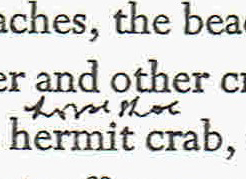 The Dry Salvages for sale, inscribed by Eliot to his fellow Faber Director WJ Crawley. This copy also bears Eliot’s handwritten correction of his notorious “hermit/horseshoe crab” error. Full details are here and further images of the items can be seen in our Members Area.
The Dry Salvages for sale, inscribed by Eliot to his fellow Faber Director WJ Crawley. This copy also bears Eliot’s handwritten correction of his notorious “hermit/horseshoe crab” error. Full details are here and further images of the items can be seen in our Members Area.
———————————————————————————————————-
Reviews of Four Quartets performed by Ralph Fiennes, June 2021
Following its Press Night, reviews have  appeared of the touring performance of TS Eliot’s Four Quartets by Ralph Fiennes.
appeared of the touring performance of TS Eliot’s Four Quartets by Ralph Fiennes.
Collected excerpts and links are on our Events page.
———————————————————————————————————-
Publication of TS Eliot and the Mother, May 2021
 TS Eliot and the Mother, by Matthew Geary, has now been published as a hardback book by Routledge
TS Eliot and the Mother, by Matthew Geary, has now been published as a hardback book by Routledge
“The first full-length study on TS Eliot and the mother,” say the publishers, “this book responds to a shortfall in understanding the true importance of Eliot’s poet-mother, Charlotte Champe Stearns, to his life and works. In doing so, it radically rethinks Eliot’s ambivalence towards women.
“In a context of mother–son ambivalence (simultaneous feelings of love and hate), it shows how his search for belief and love converged with a developing maternal poetics.” The book combines standard literary critical methods and archival research with innovative feminist, maternal and psychoanalytic theorisations of mother–child relationships.
Matthew Geary is an independent scholar in English Literature, Modernism, Psychoanalysis, Feminist Philosophy, Critical Theory, and Maternal Studies. At the TS Eliot Festival in 2016, he spoke on An Investigation into Eliot and Motherhood.
“TS Eliot and the Mother reveals the role of the mother and the dynamics of mother–son ambivalence to be far more complicated, enduring, changeable and essential to Eliot’s personal, religious and poetic development than previously acknowledged.” Details of the Routledge book are here, and chapter abstracts and academic access to the book’s content online are here.
———————————————————————————————————-
Murder In The Cathedral – BBC Television’s “first identifiable drama”, May 2021
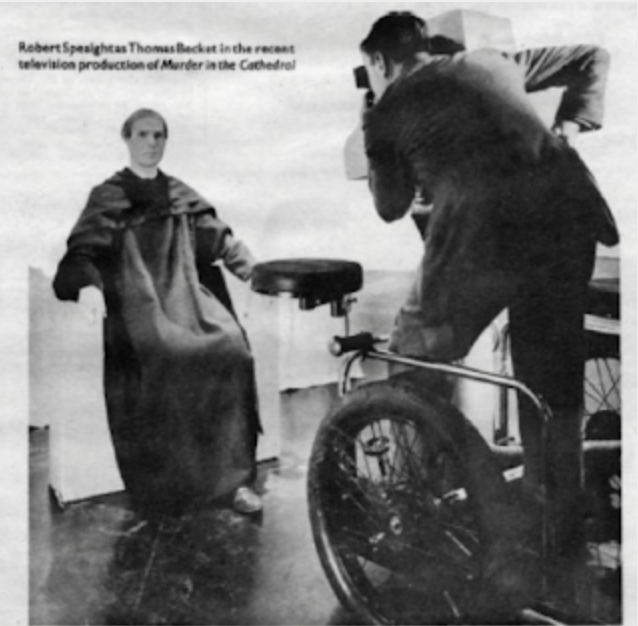 At a surprisingly early date in 1936, Murder In The Cathedral became the first drama to be broadcast by the BBC, writes Mitchell Hadley on his blog, It’s about TV – Adventures in Classic Television
At a surprisingly early date in 1936, Murder In The Cathedral became the first drama to be broadcast by the BBC, writes Mitchell Hadley on his blog, It’s about TV – Adventures in Classic Television
The BBC had been experimenting with television as early as 1930, and it began regular television service on November 2, 1936. However, a month earlier, the network made a test broadcast of TS Eliot’s play. Having successful passed the test, the play was broadcast at 3:30 p.m. on December 7 1936 on a program called Theatre Parade, and was repeated again on December 21.
This was the first opportunity for television to explore the dramatic potential of special effects. “We saw Thomas Becket in close-up, soliloquising about his temptations,” writes Hadley, “and, as he weakened, the temptation appeared, whispering into his ear. As Thomas strengthened in purpose, the vision vanished. For, by placing the tempter before a separate camera, it was possible to superimpose the tempter on to the picture of Becket and fade it in and out at will.”
As well as the production itself, Hadley explores the reasons why the BBC chose Murder In The Cathedral, and the significance at the time of its themes of church and state. “As critic Wheeler Winston Dixon wrote, ‘the main theme of Eliot’s play is the power of resistance to authority that one believes to be either corrupt or fraudulent. Since Eliot wrote the work in the shadow of Hitler’s rise to power in 1933, there can be little doubt that he had the usurping forces of fascism in mind as he composed Murder in the Cathedral.’”
———————————————————————————————————-
Foreign student TS Eliot gets out of First World War Germany, May 2021
 As part of its 125th anniversary celebrations, the Review section of The New York Times has published from its archives the first mentions in the newspaper’s pages of several leading US writers – and unearthed this mention of a student TS Eliot, travelling out of First World War Germany in 1914.
As part of its 125th anniversary celebrations, the Review section of The New York Times has published from its archives the first mentions in the newspaper’s pages of several leading US writers – and unearthed this mention of a student TS Eliot, travelling out of First World War Germany in 1914.
“T.S. Eliot of St. Louis, a student in the Summer School of Magdeburg University, arrived in London today with a number of students from Freiburg and other German universities which have been closed on account of the war,” The New York Times reported on Aug. 27, 1914.
“It is unlikely that any of the German universities will open this Fall,” he told the paper, “as all the German students and likewise the professors are subject to military duty. Conditions are too unsettled for the few foreign students whose countries are not fighting Germany.”
The article, including many other writers such as Fitzgerald and Kerouac, is here.
———————————————————————————————————-
The Waste Land as a love letter to Englishness, May 2021
 In a brief Comment article in The Telegraph, the political journalist and biographer Simon Heffer writes that “Whatever else TS Eliot’s challenging masterpiece means, it captures the sound of a poet returning to his British roots.”
In a brief Comment article in The Telegraph, the political journalist and biographer Simon Heffer writes that “Whatever else TS Eliot’s challenging masterpiece means, it captures the sound of a poet returning to his British roots.”
Heffer describes The Waste Land as “something that is not usually commented upon: it is a manifestation of Eliot’s assumption of Englishness.” He briefly traces Eliot’s ancestry, and “almost comical” Anglicisation. And he observes that “In The Waste Land, despite its quotations in German, its references to Italy and intonements in Sanskrit, Eliot drinks in the sights, sounds and idioms of early 20th-century England and puts them into verse.”
“Of course,” Heffer concludes, “it is a poem about so much else: but it is also a poem about Eliot’s return to the land of his forebears, and a tribute to quotidian Englishness, dressed in verse of unusual genius.”
———————————————————————————————————-
Hannah Sullivan and Michael Portillo discuss TS Eliot in Margate, May 2021
 In the latest of his BBC TV series, Great British Railway Journeys, Michael Portillo travels to Margate, and discusses TS Eliot and The Waste Land on Margate Sands with the academic and poet Hannah Sullivan.
In the latest of his BBC TV series, Great British Railway Journeys, Michael Portillo travels to Margate, and discusses TS Eliot and The Waste Land on Margate Sands with the academic and poet Hannah Sullivan.
Standing in front of the Nayland Rock Shelter, where TS Eliot wrote, Hannah Sullivan explains why Eliot chose Margate, “not the kind of seaside town the Bloomsbury Group were going to”, for both convalescence and stimulation; she describes The Waste Land for a first-time reader, and reads from Section III of the poem.
The programme includes views both of, and from, the shelter; the programme is now on BBC iPlayer, and the Eliot section begins at 23.03.
———————————————————————————————————-
Call for Papers for International TS Eliot Society online meeting, May 2021
 The annual meeting of the International TS Eliot Society, based in the US, is to be held online on 24th and 25th September 2021, offering ease of access to scholars based in the UK.
The annual meeting of the International TS Eliot Society, based in the US, is to be held online on 24th and 25th September 2021, offering ease of access to scholars based in the UK.
The Society is inviting proposals for papers to be presented. Clearly organized proposals of about 300 words, submitted as Word or PDF documents, on any topic reasonably related to Eliot, along with brief biographical sketches, need to be submitted by June 1.
The meeting incorporates two peer seminar sessions; these offer an opportunity to share work with a group of participants who share your interests. Participants will pre-circulate short position papers (5 pages) by September 1; peer seminars will meet to discuss the pre-circulated papers for two hours on the first day of the meeting.
There are two peer seminar sessions; “Eliot’s Influence”, led by Anthony Cuda; and “The Waste Land in 2021”, led by Megan Quigley. While peer seminar registration continues into July, the deadline for abstracts for panel presentations is June 1.
The memorial lecture will be given at the meeting by Robert Pinsky, whose lecture “T. S. Eliot, 1933, 1958, 1962, 2016” will offer a practicing poet’s impressions of Eliot’s work.
Full details of the meeting, sessions and submission e-mail address are here.
———————————————————————————————————-
Spring issue of Exchanges…, our Society quarterly, May 2021

The Spring issue of our Society quarterly is now available. Its contents include an article on competing editions of TS Eliot’s prose; an essay on the winner of the 2020 TS Eliot Prize for Poetry, How to Wash a Heart by Bhanu Kapil; a disputed annotation on lines from ‘Preludes’; and a personal story of coming to Eliot through an album by Genesis.
You can download this new issue here.
———————————————————————————————————-
Participants sought for Murder in the Cathedral drama course and filming, April 2021
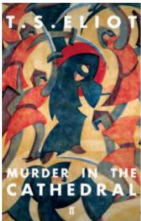 A six-week online Acting Advanced course at CityLit adult education college offers an opportunity to rehearse and film scenes from Murder in the Cathedral, for inclusion in an upcoming Thomas Becket exhibition at the British Museum.
A six-week online Acting Advanced course at CityLit adult education college offers an opportunity to rehearse and film scenes from Murder in the Cathedral, for inclusion in an upcoming Thomas Becket exhibition at the British Museum.
“This is an exciting opportunity to use prior training in acting and screen work,” explains the course outline.
“Rehearsals will be online, rigorous and focused on preparation for achieving your best ‘on screen’ performance. The face-to-face shoot date will take place on-site at the British Museum under Covid safety guidelines. Your recorded work will be shown publicly as part of the Thomas Becket exhibition in Summer 2021 at the British Museum.”
Details of fees, dates and course level are here. Further details of the British Museum exhibition are here
———————————————————————————————————
Recording released of Emily Hale letters event, April 2021
 A recording has been released of the online discussion, TS Eliot & Emily Hale Letters: Re-examined, hosted by Princeton University Library on 18th April.
A recording has been released of the online discussion, TS Eliot & Emily Hale Letters: Re-examined, hosted by Princeton University Library on 18th April.
The discussion begins with the story of the donation and storage of the letters at Princeton, with some behind-the-scenes images of their opening last year:
Then several Eliot scholars, who have had access to the letters, discuss the letters from archival, biographical and literary perspectives. The discussion concludes by answering questions from the online audience.
The recording is available here
———————————————————————————————————-
The Journal of the TS Eliot Society 2021 published, March 2021
 The 2021 edition of the academic peer-reviewed Journal of the TS Eliot Society has been published.
The 2021 edition of the academic peer-reviewed Journal of the TS Eliot Society has been published.
Edited by Dr Scott Freer, the essays in the 2021 edition cover a wide span of TS Eliot’s literary career, from his early female portrait poems (1908) to The Cocktail Party (1947):
• Editorial, by our Editor, Dr Scott Freer
• ‘First…Rapture…Then…Revolt’: TS Eliot and Dante Gabriel Rossetti, by DMR Bentley
• ‘Must I Become After All What You Would Make Me?’: Staging Relationships and Emotional Addictions in TS Eliot’s The Cocktail Party, by Sara Lo Piano
• ‘A Deeper Communion’: Eliot and Messiaen on Time and Eternity, by Ryanne J McLaren
• Reaching into the Silence: Representing the Transcendent in Four Quartets, by Dan Satterthwaite
For a full list of contents, and for details of how to obtain a copy, please visit our dedicated Journal page via the menu above.
NB Members are entitled to a free copy, and once again this year the Society will cover the costs of post and packing.
———————————————————————————————————-
Two major recordings of TS Eliot made available online, March 2021
 Harvard have been granted permission to release online TS Eliot’s earliest known recordings, in addition to a complete live reading which he gave at Harvard.
Harvard have been granted permission to release online TS Eliot’s earliest known recordings, in addition to a complete live reading which he gave at Harvard.
On Harvard’s In Focus: Poetry page, under T.S Eliot’s Earliest Harvard Recordings, you can hear a recording made for the Harvard Vocarium label. The seven tracks include readings of The Hollow Men and Gerontion which are Eliot’s earliest known poetry recordings.
And on SoundCloud you can hear a recording of a complete live reading Eliot gave at Sanders Theatre, Harvard in 1947
Eliot prefaces this reading with an introduction, in which he explains that he will read his poems in chronological order, choosing from what he describes as “a meagre output”, partly because “every author likes to think that his most recent work is his best”. But he also confesses that “one becomes out of touch with one’s very early work…it seems to have been written by a young person with whom one is intimately and rather embarrassingly associated, and of whom one is slightly ashamed.” He reads from nine works, beginning with Preludes and ending with Little Gidding.
“The value of these recordings lies primarily in the document they provide of a poet’s encounter with work written by his younger self, a self which appears now a stranger to him,” said Clare Reihill, trustee of the TS Eliot Estate, which granted permission to make the recordings available. “As Eliot says in his opening remarks to the 1947 recording, [the poems] feel as though they were by someone else. In his voice, I think, one can hear a sort of resigned sadness tinged with self-deprecation.”
———————————————————————————————————————-
Ralph Fiennes to perform Four Quartets live, March 2021
 A live, touring performance of Four Quartets by Ralph Fiennes has been announced.
A live, touring performance of Four Quartets by Ralph Fiennes has been announced.
Visiting a series of regional theatres, Fiennes will perform the work to socially distanced audiences, against an austere, simple set. The show has dates from May to July, and will hopefully extend into August.
For details of the show, its venues and ticket details, see our Events page.
———————————————————————————————————————-
The Waste Land as a post-pandemic poem, March 2021
 In an essay in Theology in Scotland, the poet and Professor Christopher Southgate considers “what contribution the arts can make to the human experience in a time of pandemic, with particular reference to works of art informed by the Christian vision, broadly understood.”
In an essay in Theology in Scotland, the poet and Professor Christopher Southgate considers “what contribution the arts can make to the human experience in a time of pandemic, with particular reference to works of art informed by the Christian vision, broadly understood.”
In Singing and dancing in the cruellest month: A reflection on theology and poetry in a time of COVID, Southgate considers The Waste Land as a post-pandemic poem.
“At this time of so much loss,” he writes, “when we struggle to stay connected, and even to sustain any sort of shared narrative of what should be happening to us, it is a profound experience to lose ourselves again in the kaleidoscope that is The Waste Land.”
He concludes that “The Waste Land wins through to the promise of the peace that passes understanding, found not in retreat from the kaleidoscope of feelings and sensations but in its centre.”
———————————————————————————————————————-
TS Eliot Estate welcomes “creative responses” to The Waste Land, March 2021
 To mark the centenary of The Waste Land in 2022, the TS Eliot Estate is inviting theatre-makers, dramatists, choreographers, video artists, composers and artists to respond to the poem.
To mark the centenary of The Waste Land in 2022, the TS Eliot Estate is inviting theatre-makers, dramatists, choreographers, video artists, composers and artists to respond to the poem.
This is the first time that such interpretations have been encouraged by the Estate. “The trustees,” they explain, “have always attempted to strike a balance between, on the one hand, remaining faithful to the poet’s wish that his work should not be staged or set to music (with the notable exception of the children’s verse of Old Possum’s Book of Practical Cats) and, on the other, acknowledging the merits of creative adaptations of his work into other forms or media.
“The Estate cannot in good conscience waive performance-rights-fees in their entirety but, throughout 2022, it would be delighted to help facilitate some projects, adaptations or use of The Waste Land that might ordinarily be judged to be too counter to Eliot’s proscriptions.”
An e-mail address to which proposals can be submitted has been posted on the Faber website and the Estate say that, together with Faber, they will make every effort to consider each application carefully and be back in touch.
———————————————————————————————————————-
Eliot, St Louis and racial segregation, March 2021
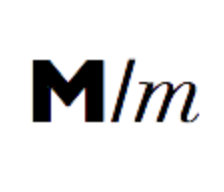 An essay in Modernism/modernity examines the racial segregation in St Louis when Eliot grew up there, and the influence which it may have had upon the alienation expressed within his poetry
An essay in Modernism/modernity examines the racial segregation in St Louis when Eliot grew up there, and the influence which it may have had upon the alienation expressed within his poetry
In TS Eliot and the Color Line of St. Louis, Frances Dickey writes that “We have not connected Eliot with segregation because his published poetry does not direct us to; however, solid historical and textual evidence suggests this connection.”
Dickey presents a fascinating racial history of the city, and then examines in particular Eliot’s notebook poem Easter: Sensations of April, which “seems inflected by a desire to make common cause with St. Louis’s Black population and yet a sense of resignation to the injustice of segregation.”
She concludes that “Examining Eliot’s St. Louis context more closely reveals how his characteristic preoccupation with social separation, which readers throughout the world now associate with modernity itself, was rooted in the lived experience of racial segregation, the religious contradiction it posed, and the sensory regime it imposed.”
———————————————————————————————————————-
A gift to Emily Hale’s ‘Uncle John’, March 2021
 A copy of Murder In The Cathedral has appeared, inscribed by TS Eliot to the Rev John Carroll Perkins. Rev Perkins and his wife Edith were responsible for raising Emily Hale, and hosted Eliot on his visits to Hale in the Cotswolds.
A copy of Murder In The Cathedral has appeared, inscribed by TS Eliot to the Rev John Carroll Perkins. Rev Perkins and his wife Edith were responsible for raising Emily Hale, and hosted Eliot on his visits to Hale in the Cotswolds.
The First Faber Edition of the play is Inscribed for Dr. John Carroll Perkins by the author T. S. Eliot 11.vi.1935 – two days before its publication.
The Revd and Mrs John Carroll Perkins were old friends of the Eliot family in Boston, and Eliot referred to them as “Aunt Edith” and “Uncle John”. In 1934 they were installed at Stamford House, Chipping Camden, and Emily Hale stayed in their adjoining Stanley Cottage. Eliot was a frequent visitor, and it was from there that he and Emily Hale took their local excursions, including their trip to Burnt Norton. By 1936 she and the Perkinses were back in Boston.
The book is currently with John Atkinson Fine & Rare Books.
———————————————————————————————————————-
TS Eliot in the diaries of others, March 2021
 In A great diarist can be spiteful and wicked but never boring, an article in The Times, AN Wilson includes two appearances by TS Eliot in an essay on famous diaries.
In A great diarist can be spiteful and wicked but never boring, an article in The Times, AN Wilson includes two appearances by TS Eliot in an essay on famous diaries.
First is the notorious revelation in his own diaries of a conversation with the Queen Mother, in which she described to him George VI and their daughters “getting the giggles” while Eliot recited The Waste Land to them. She remembered it as The Desert.
And later he draws upon Virginia Woolf’s diaries, which he says “ooze with spite”. He quotes her description of TS Eliot as “a ‘queer, shifty creature’ with ‘wild eyes’ and ‘the head very remarkable, all rocky, yellow, riven & constricted’.
The full article is available to Times subscribers here.
———————————————————————————————————————-
Old Possum and the Tandy ‘Fambly’, February 2021
 A First Illustrated Edition of Old Possum’s Book of Practical Cats has surfaced, inscribed by TS Eliot “To the Tandy Fambly from O.P.”
A First Illustrated Edition of Old Possum’s Book of Practical Cats has surfaced, inscribed by TS Eliot “To the Tandy Fambly from O.P.”
The Tandys were close friends of Eliot, and Alison Tandy was one of the original dedicatees of the book.
The spelling ‘fambly’ makes the inscription particularly interesting. It is recorded as a variant by Ricks & McCue to The Old Gumbie Cat, and was frequently used in letters to the Tandys.
‘O.P.’ is of course an abbreviation of Old Possum.
The book is for sale and further images can be viewed here.
———————————————————————————————————————-
First appearance of The Waste Land for sale, February 2021
 A rare copy of the first issue of The Criterion has come on to the market – the October 1922 issue being the first appearance in print of TS Eliot’s The Waste Land.
A rare copy of the first issue of The Criterion has come on to the market – the October 1922 issue being the first appearance in print of TS Eliot’s The Waste Land.
“Copies, especially any in collectable condition, are quite scarce and much sought-after,” say the dealers Peter Harrington, offering an opportunity to see pictures of this rare item.
They describe this copy thus: “Wrappers a little marked and toned, mild foxing to contents; a very nice copy, well-preserved, of this fragile publication.” Their asking price is £6.750.
This achieves a remarkable trilogy of First Editions of The Waste Land currently in Peter Harrington’s hands. The dealer is also currently offering copies of the Boni & Liveright First Edition in book form (£7,500), and the First UK Edition by the Hogarth Press (£8,750).
UPDATE: Both the first issue of The Criterion, and the first Hogarth Press edition, have now gone.
———————————————————————————————————————-
David Baddiel questions TS Eliot broadcast, February 2021
In his new book, Jews Don’t Count, writer and comedian  David Baddiel questions a BBC broadcast of Eliot’s poems, Gerontion and Burbank with a Baedeker: Bleistein with a Cigar.
David Baddiel questions a BBC broadcast of Eliot’s poems, Gerontion and Burbank with a Baedeker: Bleistein with a Cigar.
On New Year’s Day 2017, BBC Radio 4 broadcast the complete poems of TS Eliot, read by Jeremy Irons. “When it came to these particular poems,” writes Baddiel, “they enlisted the help of Anthony Julius, a Jewish lawyer, and the author of T. S. Eliot, anti-semitism and literary form, who prefaced the readings with his theory of how the highly prevalent, fashionable antisemitism of the time informed and possibly even enhanced Eliot’s work.”
Baddiel, “an Eliot fan”, contacted and had a lengthy lunch with Julius to discuss the issue. “But none of this shook off the feeling I had, on that New Year’s Day 2017, that, however great the writer, however great the writing, no other minority group would be compared to rats, or envisaged as any similar negative racist stereotype, on Radio 4.”
The issue is considered in an extract from the book published in the TLS.
———————————————————————————————————————-
The TS Eliot/Emily Hale letters – material and meaning, February 2021
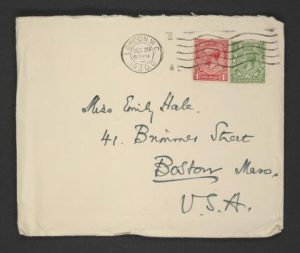 Two researchers working on Eliot’s letters to Emily Hale have published an article for Modernism/modernity considering the physical nature of the Eliot/Hale correspondence, and how the letters themselves became an “increasingly awkward embrace between the two of them.”
Two researchers working on Eliot’s letters to Emily Hale have published an article for Modernism/modernity considering the physical nature of the Eliot/Hale correspondence, and how the letters themselves became an “increasingly awkward embrace between the two of them.”
In Joint Property, Divided Correspondents: The TS Eliot-Emily Hale Letters, Frances Dickey and John Whittier-Ferguson consider the physical characteristics of the letters. and the differences between researching the original documents and their digital surrogates.“Our post explores the ways that the special significance of paper inflected the Eliot-Hale correspondence from the beginning,” they write, “and continues to shape its reception in fundamental, strange, and curiously fitting ways.”
They go on to examine the legal ownership of the letters’ contents, and the copyright control over quoting from them. “The distinction between the letters’ contents and their material medium remained salient,” they say, “and has only increased in significance since their deaths.”
———————————————————————————————————-
TS Eliot documentary released on DVD, January 2021
TS Eliot: The Search for Happiness, a documentary from  Odyssey Television first shown last year on Sky Arts, is being released on DVD.
Odyssey Television first shown last year on Sky Arts, is being released on DVD.
The 50-minute documentary traces Eliot’s life and work, with contributions from a number of Eliot authorities, including Lyndall Gordon, Sarah Kennedy, Hannah Sullivan, Jason Harding, and former Editor-in-Chief of Faber & Faber Robert McCrum. Their contributions place Eliot’s poetry in the contexts of his life, his character and his times.
Included in the documentary are many previously unseen images, as well as archive footage of Eliot, at his Nobel Prize ceremony, recording at the BBC, and in colour home movies from his holidays with Valerie. The documentary visits the UK locations of Four Quartets, and there is footage of Valerie talking about her husband in 1971.
The DVD is widely available to buy from January 24th.
Members have an opportunity to win a copy of the DVD – see the Members Area for details.
———————————————————————————————————-
TS Eliot’s return to St Louis, January 2021
 An article in the St Louis Post-Dispatch STL Today recalls TS Eliot’s first return to St Louis in 19 years, in January 1933. He had returned to lecture on Shakespeare, to 900 people in Washington University’s Graham Chapel.
An article in the St Louis Post-Dispatch STL Today recalls TS Eliot’s first return to St Louis in 19 years, in January 1933. He had returned to lecture on Shakespeare, to 900 people in Washington University’s Graham Chapel.
Speaking to local reporters, Eliot said that he was surprised by growth west of Forest Park, but otherwise recognized his home town.”It is bigger and all that sort of thing, but it is still the St. Louis I knew,” he said.
He had never moved back from London, he said, “because I had a job there, so I stayed.”
Asked about the First World War’s influence on writers, Eliot is quoted as saying, “Some of them find the peace pretty terrific, too.”
And he said that the world of poetry no longer argued over formal structures. “You can be as free as you like without attracting much notice,” he said. “You can even be free to write regular verse.”
But he claimed that he didn’t actually like to write. “There are so many more pleasant things do to than writing — sun bathing, for instance,”
The article is online here, but is not accessible from Europe for reasons of data protection.
———————————————————————————————————-
Fresh insights from TS Eliot’s letters to Emily Hale, January 2021
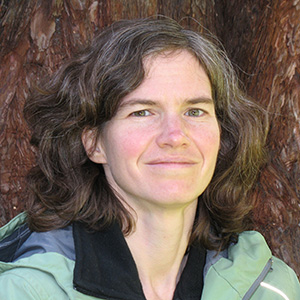 A fascinating essay by Frances Dickey looks further into the content of Eliot’s letters to Emily Hale, and posits that “not just Eliot’s writing from the years they were together, but all his major works from “La Figlia” through Four Quartets show her magnetic pull on his imagination.”
A fascinating essay by Frances Dickey looks further into the content of Eliot’s letters to Emily Hale, and posits that “not just Eliot’s writing from the years they were together, but all his major works from “La Figlia” through Four Quartets show her magnetic pull on his imagination.”
In her Reports from the Emily Hale Archive, Dickey, who teaches modernism and American literature at the University of Missouri, has been assiduously working through and reporting on the Hale correspondence since their opening a year ago.
“My first reaction to Eliot’s correspondence with Hale was astonishment at how consciously he used his personal experience as poetic material,” she writes, “while deliberately concealing from the public the roman à clef nature of his writing. For this reason alone, the opening of these letters feels like a historic drawing back of the curtain. But on reflection, I find something even more remarkable than how his art reflects his life: the way art shaped his life, beyond what his most astute critics have surmised.”
This essay not only provides a clear and perceptive tracing of the narrative of their relationship from an established Eliot scholar; Dickey goes further, in drawing connections with lines and images from several major works. She provides an explanation for the “framing” of The Waste Land’s hyacinth girl within passages from Wagner. And she draws connections between Burnt Norton and Shelley’s Epipsychidion, from which Eliot initially intended to take his poem’s epigraph. Dickey argues that Shelley’s poem may shed further light upon Eliot’s relationship with Hale.
The essay, May the Record Speak: The Correspondence of T. S. Eliot and Emily Hale, is published in the journal Twentieth-Century Literature, and a PDF can be downloaded here from the University of Missouri.
———————————————————————————————————-
TS Eliot appears in archive Canterbury footage, January 2021
 A short (3min) black-and-white archive film captures TS Eliot at the original 1935 production of Murder In The Cathedral.
A short (3min) black-and-white archive film captures TS Eliot at the original 1935 production of Murder In The Cathedral.
Made by amateur film maker Sydney Bligh, the silent footage captures Eliot and other members of the production a week after the play’s first performance in Canterbury Cathedral’s Chapter House.
Eliot is seen both alone, blinking somewhat nervously, and in a trio of “Producer, Prompter and Writer”. There are also shots of several cast members. The film has now been made available from Screen Archive South East through the BFI.
At the same time, the Canterbury Cathedral archives have published an article drawing upon the designs and photographs which they hold from that original production. It focusses in particular on the costumes, designed by Stella Mary Newton (née Pearce), who had also designed the costumes for The Rock.



